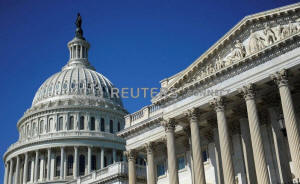U.S. Congress approves, sends to Trump $8.3 billion to fight coronavirus
 Send a link to a friend
Send a link to a friend
 [March 06, 2020]
By Richard Cowan and David Morgan [March 06, 2020]
By Richard Cowan and David Morgan
WASHINGTON (Reuters) - The U.S. Senate on
Thursday passed and sent to President Donald Trump an $8.3 billion
funding bill to help state and local governments combat the spreading
coronavirus, as public health experts outlined efforts to rapidly
accelerate testing for the disease.
By a vote of 96-1, the Senate approved legislation that was
overwhelmingly passed on Wednesday by the House of Representatives.
Republican Senator Rand Paul, who objected to spending the money without
first reducing federal spending elsewhere, was the lone dissenter.
Trump is expected to sign the bill into law so that the billions of
dollars can flow toward developing vaccines against the highly
contagious coronavirus and aiding international efforts to control
transmission.
Trump initially requested $2.5 billion, with much of that coming from
previously appropriated funds.

Senate Majority Leader Mitch McConnell, a Republican, said of the
emergency funding bill, "It's a serious agreement to meet a serious
challenge and today we will send it to President Trump's desk."
Action by Congress comes as U.S. deaths related to coronavirus
infections rose to 11 on Wednesday and new cases were identified on both
coasts - around New York City and Los Angeles.
New York state's confirmed coronavirus cases have doubled to 22,
Governor Andrew Cuomo announced on Thursday.
Washington state has been hardest hit so far. Democratic Senator Maria
Cantwell said the legislation will provide $11.5 million to help her
state's health department respond to the crisis.
"We need these funds. We need them now and we need other states to heed
the early testing that would have been helpful in our state and now may
be helpful in yours," Cantwell said.
Meanwhile, House Speaker Nancy Pelosi told reporters that experts
working for Congress have suggested ways for technology to help
lawmakers and their staffs work from home or elsewhere if a coronavirus
outbreak hit the city of Washington.
[to top of second column]
|

The U.S. Capitol dome and U.S. Senate (R) in Washington, August 2,
2011. REUTERS/Jonathan Ernst/File Photo

But, Pelosi added, "They have to be here (in the Capitol) to vote"
on legislation.
The money to fight coronavirus includes over $3 billion for research
and development of vaccines, test kits and medical treatments.
Another $2.2 billion would aid public health activities on
prevention, preparedness and response to outbreaks.
The federal government would dedicate $1.25 billion in coming weeks
and months to help international efforts aimed at reining in the
virus, which was first detected late last year in China and has
since spread around the globe.
Earlier on Thursday, Health and Human Services Secretary Alex Azar
and Anthony Fauci, the director of the National Institute of Allergy
and Infectious Diseases, were among administration health experts
briefing House members about battling coronavirus.
Representative Rosa DeLauro, who chairs a House panel that oversees
federal spending on health programs, said she did not get
satisfactory answers from officials about access to testing and
diagnostics and how to help people who do not get paid sick days
through their jobs or who have no health insurance.
Republican Representative Tom Cole, however, gave an upbeat
assessment. "We're still behind the curve there, but the sense is
we'll be moving pretty quickly and able to catch up," Cole said. He
was referring to the growing number of tests that will be
manufactured and could total around 1 million by next week.

Besides dispatching money throughout the United States, the bill
approved by Congress also would provide for low-interest federal
loans to businesses affected by a coronavirus outbreak.
(Reporting by Richard Cowan, David Morgan and Lisa Lambert; Editing
by Dan Grebler and Jonathan Oatis)
[© 2020 Thomson Reuters. All rights
reserved.] Copyright 2020 Reuters. All rights reserved. This material may not be published,
broadcast, rewritten or redistributed.
Thompson Reuters is solely responsible for this content. |